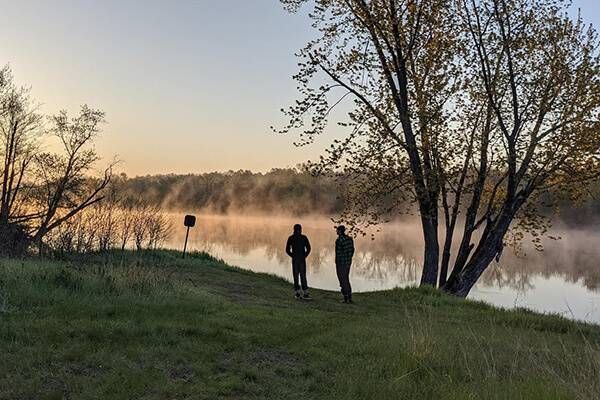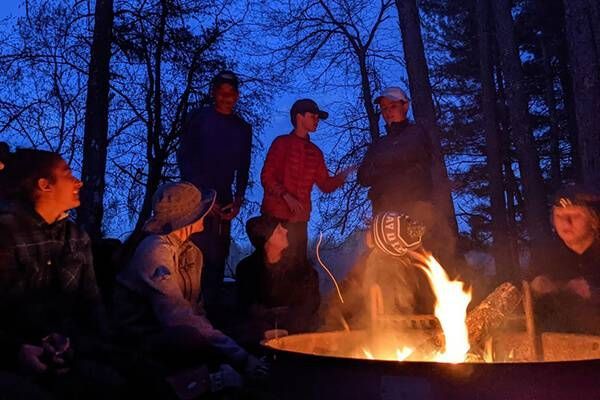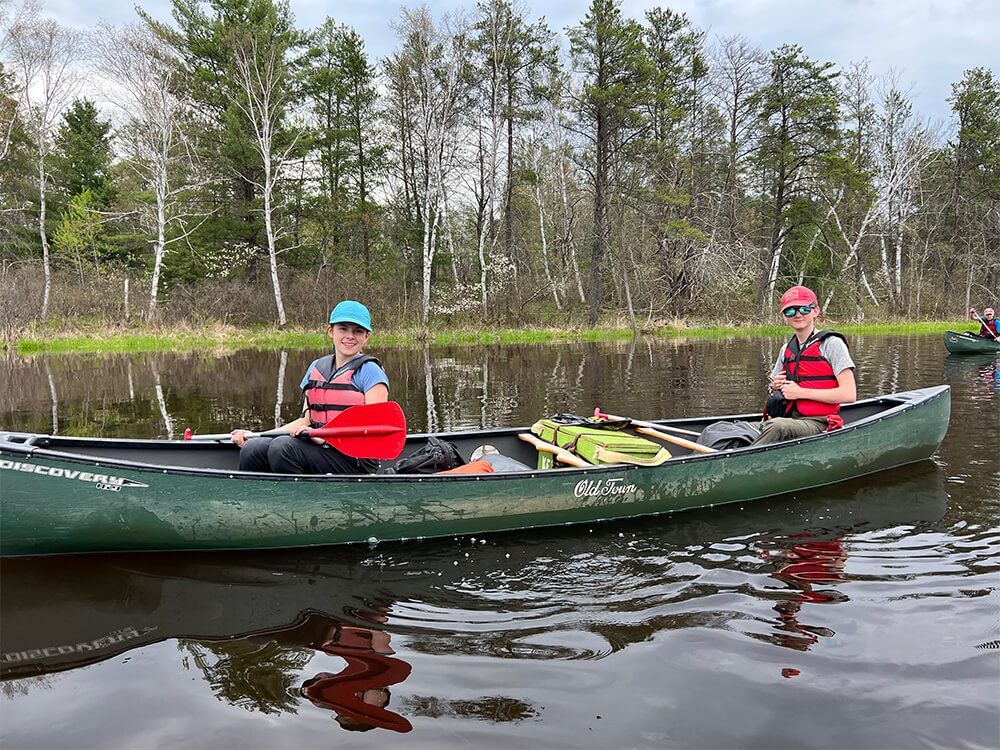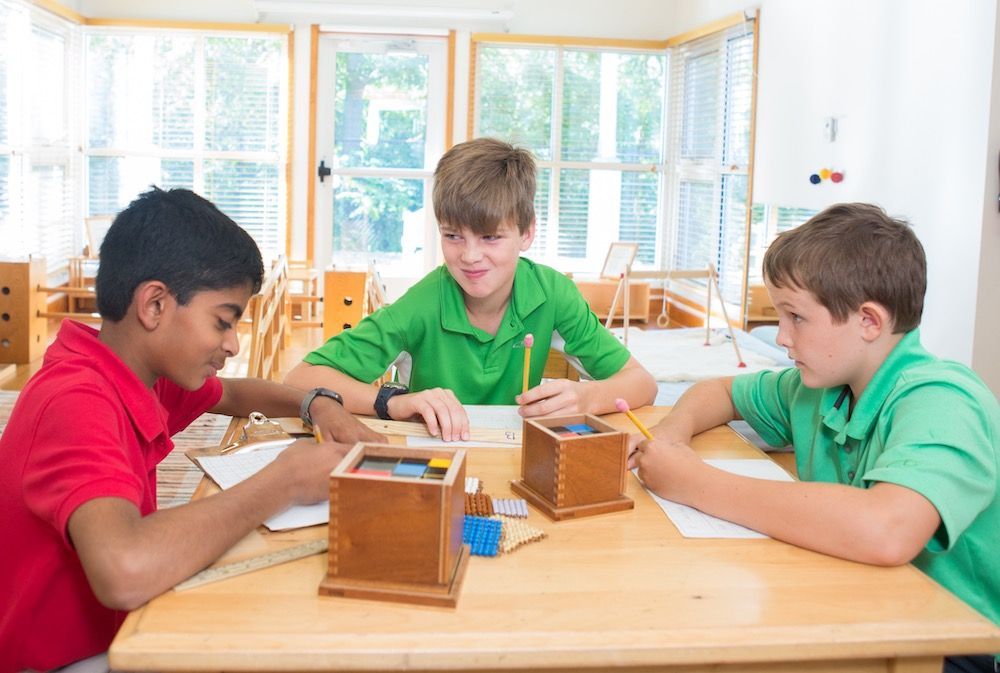
Every fall, the Montessori Secondary Level students at Forest Bluff School head to the north woods of Wisconsin for a two-week long camping and work trip. This year, despite the limitations of Covid, the teachers and Head of School wanted to offer this same experience to their students. The only question was what they were going to need to do to make this possible—and safe.
Secondary Level Director Abbey White shares, “We know the value of the trips. We always felt we were going to do this, we just had to figure out how.”
Each year, the students and teachers of this age group (12-14-year-olds) embark on three separate two-week trips: fall, winter, and spring. The purpose of these excursions is to unite them as a community, to connect them to nature, and to help them develop a deeper sense of themselves. Head of School Paula Preschlack wrote about the importance of these trips in an article in the fall of 2020:
People need to be actively working together interdependently to become contributing members of any community, and to develop themselves fully… Important parts of our children’s development happen when they experience living away, even for brief periods, out in the world. (“Adolescents Find Strength in Nature and Community” Forest Bluff School Blog)

Through these trips, the Secondary Level students have this opportunity to work together authentically, away from the pressures and expectations of their normal days. They become a true community during these times, and they develop an understanding and awareness of themselves that serves them through the rest of their lives.
Maria Montessori wrote, “There must be provision for the child to have contact with nature, to understand and appreciate the order, the harmony and the beauty in nature… so that the child may better understand and participate in the marvelous things which civilization creates” (Montessori, The Secret of Childhood). By being in the wilderness, children are able to become better citizens of the world they live in.
Starting the School Year Safely and In Person
Once it became clear that schools were going to have the option to open in September, Forest Bluff began making preparations for safe in-person learning, following CDC and Illinois Department of Public Health guidelines and recommendations. Co-founder and Head of Admissions Lynn Jessen came to school every day in the summer of 2020 with the constantly updating guidelines and a tape measure (to account for physical space). “We have to open,” she said at the time. “Our students need us.”
With that attitude, Forest Bluff was able to create a safe in-person learning plan so that every student who wanted could enter the building when the school year started.
In this spirit of creativity and persistence, the Secondary Level teachers turned their attention to the fall trip. “We wanted to show the students that you can always carry on in some way,” Mrs. Preschlack comments. “We wanted to demonstrate for them that by persevering, we can still find reasons to live. Hope, joy, and community are always possible.” Knowing how essential this experience was to the Montessori program, the teachers and staff began exploring every contingency, every necessary precaution, and every point of possible vulnerability.
Preparing for the First Trip
It became clear quite quickly that the first essential element of making the trip possible would be to establish trust with the parents. The parents needed to trust the school and the teachers fully in order to send their children anywhere with them in 2020. “Taking adolescents into the wilderness is daring to begin with,” Mrs. Preschlack observes. “Doing it during a pandemic requires even more courage.”
Mrs. Preschlack and Secondary Level Director Peter Dutko drove to each family’s house individually in August of 2020—thirteen homes in total. Ms. White joined the meetings once she completed her summer Montessori training. They met outside, wearing masks, to discuss the parents’ feelings, fears, and hopes. These meetings built trust in two ways. First, Mr. Dutko was a new teacher to the school. None of the families had ever met him, so holding this meeting allowed them to see him in person and get to know him. Secondly, it affirmed that Forest Bluff was hearing and addressing every concern of every family before creating the plans for the trips. In this way, they were able to assess the risks and weigh them against the potential positives.
After collecting the information and concerns from all the individual meetings, the teachers, the school nurse Maggie Kelly, and Mrs. Preschlack began systematically creating a plan that addressed every single possibility. They considered the areas where the students would be at greatest risk, namely, transportation, sleeping, eating, working together, and passing non-community members on the drive or at the site, and sought to eliminate the risk of each of these points as much as possible. The students and three staff members—Mr. Dutko, Ms. White, and Support Director John Dickson—would all be tested before starting the trip, sleep in separate tents, use a bleach solution to clean the dishes, wear masks while working outside, wipe down any common areas, and more. They put all these precautions into an organized plan that documented every known risk and their efforts to mitigate it.
Additionally, they created a flow-chart that broke down the decision making process if any of the students or school staff exhibited any signs of illness. This way they were able to clearly inform parents as to how they would determine when to seek treatment, test a child, or send someone home, and at what point the parents would be alerted. Mr. Dutko has years of experience with emergencies in the woods and on the water. He is trained in wilderness medicine and has traveled hundreds of miles from civilization in remote areas of Canada over the last 13 years. This background uniquely suited him to guide this decision making process. “This is how wilderness medicine works,” he shares. “You stabilize and generalize, and you determine if someone needs to be evacuated.”
Finally, they chose to make the trip optional for students. This way, parents could feel ownership over their choice, and make the best decision for their own family’s health and circumstances. While one family chose to opt out of this first trip because of their specific family’s situation, the rest opted in.
The painstaking processes laid a foundation of trust for the families. “Frankly, we were thrilled this was going to happen,” one father says. “The school took such thorough and sensible precautions to minimize risk, and communicated their plans so well, that we knew our child was in good hands.” The students themselves had the same trust in their teachers. A mother remembers her son sharing with her, “They have managed to keep us safe so far. What would be so different if we went somewhere else as the same group?”
A Successful First Trip
The thorough and scrupulous efforts of the families, staff, and students were not in vain. Not only did the class manage to maintain their health throughout the trip, they also had a positive experience both emotionally and developmentally. They contributed to the land, they worked together, and they found opportunities to persevere and build their own strength.
Normally, the students take on a single large project during their fall trip to Camp St. Croix YMCA Camp. But this year, because of budget constraints, “Buffalo Bob” (the point person on grounds) had many small tasks he needed done that he could not do on his own. Rather than feel disappointed that they would not have the same large effect on the camp, the students were buoyed by his gratitude. “They saw how much Bob appreciated it, and they saw his joy. It made them buy in,” observes Mr. Dutko. They even cleaned up the side of the road, and took pride in gathering every tiny piece of styrofoam they could see. “I’ve always wanted to do this!” one student shared. In this way, the students were able to see the significance their efforts had in these humble tasks. Their confidence in themselves grew because their work served a real need in the world.

Ms. White remembers, “There was a day near the end when the students were deciding whether to push on. They were hot from working with their masks on, and tired from almost two weeks of physical labor. We were deciding what to do when we looked up and saw students returning to the group with fresh water bottles. They rose to the challenge and decided to keep going. It was a beautiful moment of resilience. We were so impressed.”
This kind of profound effort arises spontaneously when children feel as though they have real work to do. “There were so many moments that felt real and challenging,” Mr. Dutko observes. “The students respond to that—they can relate to that. This isn’t just some activity adults are making them do. This is real and authentic.”
It is this authentic work and feedback that gives these adolescents a deep sense of their own capabilities and the necessary contributions they can make to the world. They learn what they can do, and they learn to trust in their own competence. The fall trip, set against the backdrop of an anxious and uncertain world, nourished these Montessori Secondary Level students like nothing else could at the time. It was a “minor miracle,” as one father shared.
Preparing for the Winter Trip
Mr. Dutko and Ms. White both emphasize that they had no reason to think that their successful fall trip meant that a winter trip would be certain. The Covid positivity rate was high, transmission was high, and vaccines still were not available for most citizens. However, the school was still open, had no recent cases of Covid, and had no transmission. The teachers were able to see that the health protocols were keeping everyone healthy and safe, and they were open to the idea of going on the winter trip. Additionally, this time parents also had less anxiety. They knew how well the fall trip had gone, they could see that the school was successful in keeping children healthy, and everyone had learned more about how the virus spread—and didn’t spread.
This year, the winter trip was scheduled to go to Ely, Minnesota, to the Wintergreen Dogsled Lodge. Students and teachers camp, hike, cross-country ski, snowshoe, work with the dogs, and ride on dog sleds. This is an unforgettable experience for the students, and they, along with their parents, were eager for the opportunity to make it work. “Our daughter had been looking forward to this [trip] literally for years,” a father shares.
When Mrs. Preschlack called Wintergreen, legendary North Pole navigator and Wintergreen founder Paul Schurke answered the phone directly. “Can we do this?” Mrs. Preschlack asked. Mr. Schurke’s answers were clear. “We can do this. We are ready. Your students are so special. We hope they’ll come.”
In this conversation, Mrs. Preschlack learned that the head of the department of health in Minnesota had visited the winter lodge herself and had gone over their practices and protocols to make sure they were safe. They could not have asked for a higher stamp of approval for their activity and destination.
Armed with this information, Mr. Dutko, Ms. White, Mrs. Preschlack, and Ms. Kelly set about to maintain the trust parents had given them by revisiting every single protocol. They created a new document that addressed every known risk for this particular trip, and how they would mitigate them. Similarly, they also created a new decision tree that reflected this endeavor. They shared the documents with the parents, and had individual conversations with every parent before finalizing their plan. This time, every family chose to participate. One mother shares her thoughts at the time: “A winter camping trip was a thrilling idea. And what better time to do this than with trained leaders?” This abundant trust in the teachers was clear.
A Successful Second Trip
Students, parents, and teachers all wholeheartedly agreed that the second trip was a triumph. “This [winter] trip was truly a life-changing experience,” a father observes. “It is remarkable how Forest Bluff School puts the students in a position to make these trips as meaningful as they are - they're overseen wonderfully, but the fact that the burden of planning and executing these trips falls more predominantly on the students than would be the case at almost any other school makes the payoff that much more genuine and meaningful.”
The students’ normal preparations were challenged further, not only because of Covid, but because of the freezing temperatures and snow of northern Minnesota. And because of the students’ individual and team efforts in putting together this trip, the results were indeed “more genuine and meaningful.” They were able to get away from the stress and restrictions of daily life, they worked hard with their bodies each day, and they cared for and connected with the animals. One mother shares that when her son came home, “He knew the names of all the dogs!”
This unique and incredible trip helped the children reconnect with nature, each other, and themselves. They grow in leaps when they have this experience. A mother shares, “You see a more grown up, more mature child coming back. They are closer to adulthood.” They are closer to the men and women they will grow up to be. They are closer to who they want to grow up to be.
Preparing for the Spring Trip
Parents and students were highly committed and enthusiastic about the spring trip, but, once again, the teachers and staff made no assumptions about safety or possibilities. “We started at zero every time. The spring trip was not inevitable,” Mrs. Preschlack shares.
The students decided that the spring trip would be a canoe excursion in the Wisconsin wilderness. While this adventure has the benefits of isolation and open air, the water itself and the size of the campsites created new challenges. The risk of tipping into the water from the canoe made wearing masks dangerous, and because the places where they would camp had restrictions on the number of tents, students were going to have to share sleeping spaces. Additionally, given the risk of ticks, they could not simply choose to sleep uncovered on the ground.
These challenges required another complete set of safety considerations and protocols. This time, the logical solution was to create a true “pod” with the students and teachers. They would all take PCR tests before travel, and then become their own family for the remainder of the trip. This way, they could take off their masks when they were in the woods or on the water together, and they could share tents for sleeping.
This proposition, once again, required commitment from every family. Mrs. Preschlack recalls, “This took a lot of work.” She reflects on the strengths of Mr. Dutko and Ms. White: “Abbey and Peter are both so sensitive to others’ feelings. It is important to both of them to have everyone on board. They care so much.” These dedicated teachers took the time and effort to reach every family, every parent, every student, and build the level of trust required for this endeavor.
A father shares, “There wasn’t a shred of doubt in our minds that Forest Bluff School handled the preparation and execution of these trips with the students’ safety foremost in their minds… It would have been easy—and irresponsible—to figure out how to make the trip happen without putting all of the safeguards in place that the school did. It is to their credit that they did the right thing, the hard thing, and made sure that all protocols were followed, and that parents bought into the school’s plan, before embarking.”
His words show just how much the painstaking efforts of the teachers and staff mattered to the parents. They were trusting their children in the wilderness with three young teachers in the middle of a pandemic. For however much these parents wanted this experience for their children’s developmental and emotional needs, it also required a leap of faith and confidence in the way the plans and processes would be set up on each individual trip.
A Successful Third Trip
The spring canoe trip brought the efforts of the entire year to fruition. On this excursion, the students worked even harder, were even more responsible, and were even more attentive to each other’s needs. Support Director Mr. Dickson shares, “I saw so much unity in the students… There was a group mindset of collaboration. I could tell the students were asking themselves, Everyone else is doing something. What can I do right now to contribute and be a unified team in this difficult endeavor?”
This kind of awareness and maturity is beyond what is normally expected in a group of 13- and 14-year-olds. These Montessori students came together amidst difficult circumstances and learned how to serve their community—and the vital ways that their own service mattered.
This unity also displayed itself in the ways they treated each other. One day some members of the group decided they wanted to travel much farther than the other days in order to reach a specific destination. Other members of the group were hesitant about this idea and wanted to continue at their normal pace.

Mr. Dickson observed the negotiations and discussions that ensued. He recalls, “They were acutely aware that they needed consensus.” One student suggested that they pair each reluctant traveler with an enthusiastic traveler. “The reluctant travelers knew they were with somebody who was willing to meet them where they were… The overall community was so supportive of every individual that nobody believed they would be left out or left behind.”
In the end, the group made it to their destination. Mr. Dickson says, “Their camaraderie and collaboration was foundational to their success. When a student feels that they can’t accomplish something on their own but they know their peers will support them through the process with respect and patience, an extraordinary level of comfort and trust is built within the group.”
The students were able to be successful because they trusted each other. They knew they were accepted for who they were. They believed in each other. Mr. Dickson recalls, “They trusted the group enough to know that everyone would show up and do their best.” This kind of trust allowed them to be fully themselves and to see themselves—positively and accurately—through their classmates’ eyes.
Why These Trips Mattered
These trips matter every year. They build confidence, they instill work ethic, they encourage independence, and they promote bonding. But this year they mattered even more. This has been a fearful and anxiety-ridden time. It has been filled with uncertainty, irregularity, unfamiliar rules, and limited opportunities for social interactions. It has been a challenging year for community and for trusting one another.
Planning and executing these trips required both community and trust. Everyone needed to come together. Everyone needed to wholeheartedly choose to be a part of this. Parents needed to trust Forest Bluff to take care of their children, the teachers and staff needed to trust families to fulfill their responsibilities, and the children needed to trust their teachers and each other.
When children are in an environment where everyone believes in their mission and in each other, they have the freedom to grow into the best version of themselves. One mother reflects, “These trips have given my child the ability to trust—his classmates, teachers, and, most importantly, himself.” In a year riddled with doubt and distrust, the Secondary Level excursions gave the students six weeks in a physical and emotional space where they did not need to doubt each other or themselves.
This mother goes on to share, “We can’t teach our child this… The maturity comes because of this program. They have to navigate all of it… They have to process all of it.” She recognizes something that is inherently true for all of humanity: No one can develop for you. You have to do it on your own. Each child must undergo their own experiences in life and take their own knowledge from it.
The Secondary Level trips provide the experiences necessary for confidence, trust in oneself, and maturity to develop. One girl shares, “I love the trips because they allow us to see each other at our worst. Then we don’t need to be awkward with each other at school. We can just do our work. We know all of each other’s strengths and weaknesses.”
There is something profound in experiencing this kind of community—a place where there is so much faith and confidence that each individual can be fully who they are, and be accepted for who they are. Then the students can mature freely and put their minds fully to their work.
Contributing to the World
Mr. Dickson says, “There is no other way for a group of adolescent students to bond so closely as through these trips. Forming secure bonds... is essential to developing confidence in themselves. They’ve seen themselves reflected in their peers…They build their identity. It is so important that they build a positive identity in themselves and in relation to their peers. Then they are free to do the work they find value in, and contribute to the world in a meaningful way.”

Human beings have an incredible capacity to affect the world - for better and for worse. Therefore, it is the responsibility of educators and parents to help children develop into adults who are committed to contributing positively to their world. In The Absorbent Mind, Montessori wrote, “[W]e begin to see one of the purposes of man’s life on earth, and to understand that man himself is one of the great cosmic forces of the universe.”
These adolescents are “cosmic forces.” Their potential is boundless, and we have the opportunity to offer them a childhood that will serve as a constructive foundation for their later work. Raising children with positive qualities is more than just a goal. It is a necessity. We need these children to be brave, to seek joy, to find the good in each other, to know how to establish trust, and to be creative. Our world is changing quickly, and this is the generation who will inherit its beauty and its problems. Let us invest in our children. Let us invest in our world.


